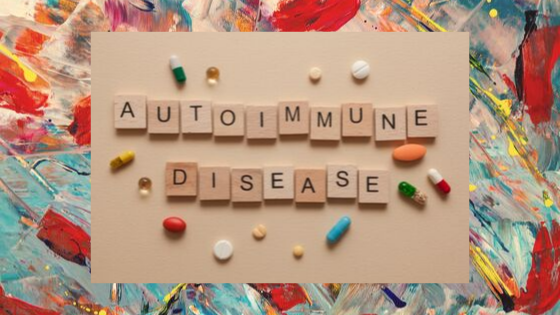Why Did I Get an Autoimmune Disease?
Or maybe the better question is, Why is my immune system attacking me?

Our bodies rely on natural defenses to keep us healthy and well. The immune system is supposed to protect us from foreign macro-molecules or invading organisms such as virus proteins, worms, or parasites. [1]
The immune system has two sides. You are born with innate immunity. Innate immunity is like the wall of a city--it can defend all attackers, and it is not specifically targeted for a particular pathogen. When it needs assistance, it signals the other side of our immune system, the adaptive or specific immunity. Adaptive immunity is your immune system’s adjustment for a different situation (adaptation) based on what antigens your body has been exposed to at any given time. [1]
The adaptive immune response is highly specific to the pathogens that it remembers. Any substance eliciting an adaptive immune response is called an antigen. [2] For example, if you had the chicken pox once, you will not get it a second time because of your adaptive immune system. However, that does not mean you would not get the mumps or measles, as these viruses are different than chicken pox and a specific memory has not yet been created in your immune system.
The job of the adaptive immune system is to destroy invading pathogens. The cells that make up the adaptive immune system have a the ability to distinguish something foreign from what is native. However, sometimes this fundamental ability fails and the immune system sees our tissue as foreign and attacks it. [3] This is called an autoimmune disorder.
When you have an autoimmune disorder, two things are happening simultaneously. First, your immune system has decided to attack healthy tissue. Second, you have inflammation, which can cause other health issues such as HPA-D (adrenal fatigue), insulin resistance, cardiovascular disease, and permeable bowel syndrome. [4]
Let's use the autoimmune disorder, Hashimoto's disease as an example. In this case, the immune system decides to attack the thyroid tissue. Along with the enraged immune system, you may feel fatigued, have tender lymph nodes, or experience weight gain, hair loss, or depression. Most likely, you are on a synthetic hormone to replace what your thyroid can no longer produce, however, prescribing a thyroid hormone does not address the real issue of your immune system attacking healthy thyroid tissue. Hashimoto's is an autoimmune disease before it is a thyroid disorder. Similarly, multiple sclerosis is an immune disease before a demyelination disorder, and Rheumatoid arthritis is an immune disease before it is a joint disorder. This process is the same with each autoimmune disorder.
What causes an autoimmune disorder and the immune system to no longer be able to tell the difference between foreign and self is not known. Researchers have been asking this question for years. While there are many ideas of what happened, there are multiple factors, including the following:
Gender - Autoimmune diseases are more prevalent in women than in men. According to the American Autoimmune Related Disease Society (AARDA.org), the ratio is 10:1.
Genetics - If a family member has an autoimmune disorder, there is a higher chance that you may develop an autoimmune disorder, although it may not be the same disease. For example, while one family member could have lupus, another could have scleroderma.
Vaccinations - In an extensive research study done by a French scientist, it was discovered that vaccines were not the major cause of autoimmune disease. However, they also suggest that a potential link between vaccines and autoimmune diseases cannot be definitely ruled out and should be carefully explored during the development of new candidate vaccines. [5]
Chemical Toxins - It has been found the chemical contamination of the environment (for example: pesticides) plays a significant role in allergies and autoimmune disorders. Research proves that these harmful chemicals cause a shift in the balance of the immune system. This shift is medically associated with a wide variety of chronic illnesses, including (but not limited to) AIDS, CFS, multiple allergies, viral hepatitis, autoimmune disorders, and a host of other chronic infections. [6]
Metal Toxins - High levels of metals in the system are associated with autoimmune conditions. Heavy metals such as mercury (found in amalgam or metal fillings) can attach to collagen tissue in those individuals with multiple sclerosis. When heavy metals are present in the tissue, the body sees them as "not self" and mounts an immune attack. [7]
Food Toxins - All processed food is toxic. Processed food is anything that has been altered from its natural state. Unfortunately, a large number of foods consumed on a daily basis are processed. Consuming these foods multiple times each day may be toxic to you and can cause your immune system to react. [8]
Food Allergies - The top foods to cause allergies and intolerances in people are wheat (gluten), corn, soy, dairy, peanuts, sesame, sugars, grains, tree nuts, fish, shellfish, and eggs. [9]
Leaky Gut - Leaky Gut is a term that modern medicine will not discuss. Unfortunately, physicians do not know enough about the gut. The gut leaks when the tight junctions do not work properly and become permeable, allowing food particles into the body. "In a self-perpetuating viscous cycle leaky gut flares up autoimmune conditions, which in turn further damages the gut lining" [10]. My fellow holistic practitioners and I believe that every person with an autoimmune also has leaky gut.
What does all this information mean? As you have read, there are a number of things that lead to chronic disease states and autoimmune disorders. And, in reality, it does not matter if you have one or all of these interferences leading to an autoimmune disorder; you need to find those interferences and remove them.
The quieting of your immune system is not a mystery; it is a method—a roadmap. Together you and I will address the foundations of your autoimmune and determine where you are imbalanced, and it always starts with nutrition. Optimizing your nutritional status by teaching the body to digest properly, and by encouraging a whole foods, properly prepared, nutrient dense diet. We will work together to remove the foods that your body views as toxic. Proper nutrition leads to strengthening and healing the immune barriers, including your intestinal barrier.
I look forward to partnering with you to determine which chemical stressor(s) you have encountered in your environment. Together we will remove them so your body can heal and you can be balanced.
1. Sompayrac, L. M. (2012). How the immune system works. (4th ed.). New York, NY: Wiley-Blackwell.
2. Owen, J., Punt, J., & Stranford, S. (2013). Kuby immunology. (7th ed.). New York, NY: W. H. Freeman.
3. Manoff, M. (2012). An epidemic of absence: A new way of understanding allergies and autoimmune diseases. Scribner; Reprint edition.
4. SE Shoelson, L Jongsoon, and BG Allison, "Inflammation and insulin resistance," Journal of Clinical Investigation (2006): 1793-1801.
5. Wraith, D., Goldman, M., & Lambert, P. (2003). Vaccination and autoimmune disease: what is the evidence?. The Lancet.
6. Ehrman, J. (2009). Pesticide use linked to lupus, rheumatoid arthritis. Retrieved from http://nihrecord.od.nih.gov/newsletters/2011/03_18_2011/story4.htm.
7. Silberod, R. (1992). A comparison of mental health of multiple sclerosis patients with silver/mercury dental fillings. 70: 1139-51, Psychology Reports.
8. Campbell-McBride, N. (2010). Gut and psychology syndrome: Natural treatment for autism, dyspraxia, a.d.d., dyslexia, a.d.h.d., depression, schizophrenia . Medinform Publishing.
9. Guandalini, S., & Newland, C. (2011). Differentiating food allergies from food intolerances. Current gastroenterology reports, 13(5), 426-434. Retrieved from 10.1007/s11894-011-0215-7
10. Kharrazian, D. (2010). Why do i still have thyroid symptoms? when my lab tests are normal: a revolutionary breakthrough in understanding hashimoto's disease and hypothyroidism. Elephant Press.
Don't Miss Out On More!

Heidi Toy FNTP
I help people all over the world heal by identifying and treating the root cause of their body imbalances. Through diet and nutrition, I guide them towards wholeness and balanced lives.
Heidi Toy Functional Medicine Blog

For many of us, our experience with food comes with some sort of baggage. Maybe you eat to cope with stress, anxiety or depression. Maybe you’ve grown up with value-words placed on food such as “junk” and “healthy,” and told you couldn’t eat the “good stuff” (brownies and ice cream) until you finished the “yucky stuff” (broccoli and lettuce). Or, even more serious, maybe you or a loved one has struggled or is struggling with an eating disorder. Food is amazing and life-giving. It can be used as a means to celebrate, socialize, or simply just provide fuel for the body. Our relationship with food shouldn’t be a difficult one, it should be an enjoyable one. A way to get to that healthy place in your relationship is to practice mindful eating. Mindfulness is a Buddhist concept of mediation that can help you recognize emotions and physical sensations present. Through mindful eating, you can learn to truly pay attention to your experiences, cravings and physical cues. The basics of mindful eating are: Eat slowly, without distraction. If you are eating with others, take a least five minutes at the start of the meal to enjoy the food on your plate before engaging in discussion. Pay attention to your body--are you still hungry, or are you getting full? Learn to distinguish between cravings and true hunger. Use all your senses when you sit down to a meal. Make an effort to notice how the food looks, smells, tastes, feels in your mouth, and sounds when you chew. Appreciate your food, who has prepared it (even if it’s you--what an accomplishment!), and where it comes from. Being mindful of your experience will help you slow down while eating. This can prevent overindulgence by making the act of eating intentional instead of automatic. It will also help you become aware of triggers that make you want to eat (are you truly hungry at 9pm every night when you sit down to watch that Netflix show, or do you just pour yourself a bowl of Chex Mix because that’s what you always do?). Knowing your triggers can give you time to process what’s truly going on and the ability to react properly.

Here are the essential functional medicine steps for Fifth Disease! If your child comes home with bright red cheeks that look like they’ve been “slapped,” chances are they may have fifth disease, also known as erythema infectiosum. This mild viral illness, caused by parvovirus B19, is common in kids and often spreads t

Successfully healing Adrenal Fatigue requires a holistic approach focussed on fixing the root cause of your problems and supporting your body through the healing process. This means we are going beyond just temporary symptom relief. We want you to return to vibrant health so you can get back to the active and healthy lifestyle that Adrenal Fatigue is holding you back from. (Adrenal Fatigue is more accurately known as HPA-D. Check out my blog HPA-D vs Adrenal Fatigue to learn more.)Again, we would be completing further testing to get to the root cause of your issues, but this protocol is a great starting point for healing. We focus on five essential areas for fast and long-term healing.

I want it! Sooooooo bad. But I want to lose weight, too. It’s not on my list of healthy, squeaky clean healing foods, but what will one little bite hurt? I can start again fresh and clean tomorrow. When brownies call your name and you are trying to break up with them, it is difficult to avoid the urge to want to indulge. But you know if you give in that you will berate yourself with guilt for the next 24-48 hours and the tsunami of eating everything off-plan will take over your life. One bite will start an avalanche... But you just can't stop thinking about the pan of brownies you made for the kids.

Did you know most people didn’t have refrigerators in their homes until well into the 1900’s? It wasn’t even invented for large scale commercial use until the mid 1800’s [1]. So how did people keep their milk cold and make their food last longer? Fermentation. It sounds like a gross concept, because we often associate fermentation with a bad odor, but foods like cheese, yogurt, sauerkraut and pickles are all fermented foods. And those aren’t gross, are they? Well, some might disagree with me about sauerkraut, but that’s beside the point. Fermented foods are digestive aids. Microscopic living organisms in fermented foods help extend the food’s shelf life, enhance flavor, and help the body absorb minerals. These organisms pre-digest the food, getting rid of harmful components, and create more vitamins and enzymes than the food began with. Enzyme-rich foods have many benefits including [2]: Increase digestibility of food we eat Boost immune system Increase alkalinity; neutralizing pH levels Provide a healthy balance of friendly flora in the gut (Learn more about your microbiome in my other blog posts ) Tone the colon and help with elimination Control cravings for unhealthier foods Eliminate toxins and undigested wastes in the body In the “old days,” people use to ferment all kinds of foods through pickling, canning, pasteurization and added salt. Nowadays, however, large scale fermentation has lost many of its nutritious benefits due to the need for speed to get the product on the shelf as fast as possible and as cheap as possible. The only true fermented foods you will find are sauerkraut, kombucha, yogurt and kefir, beans, wine and beer, some meats (such as salami and pastrami), legumes and nuts (such as tofu, soy sauce and miso), sourdough bread, and various kinds of vegetables [3]. Fun facts about sauerkraut: The Germans “stole” it from the Chinese! Sauerkraut (probably not labeled as such for the Chinese, but the same recipe) was one of the main foods for those who built the Great Wall of China. Genghis Khan brought it to Eastern Europe during an invasion. It also contains high levels of vitamin C, and sailors often took it on long journeys to prevent scurvy.

How can we best keep blood sugar stable? Do what our body is designed to do – use fat for energy. Our species did not survive the Ice Age because of vanilla coffee lattes and cheesecake. Throughout most of our history, we ate a diet that was likely 50-70 percent fat. Look at the old family photo albums, specifically pictures of people in the first half of the 1900s, before we had so many processed foods. You won’t see many fat people--in fact, most look darn skinny. If they lived on the farm, they ate lots of eggs, meat, milk, and vegetables out of their own backyards. “Diet foods” were non-existent. Heart disease was almost non-existent. Our metabolism is designed to work much better with fats better than with sugar. Fats provide the slow and steady fuel our body likes to use for energy. Think of fats as a slow-burning log on the fire. One log (i.e. one meal containing fats) lasts for hours. Starchy carbs, on the flip side, are like kindling. You constantly have to throw more twigs (chips, pasta, bagels) to keep the fire burning. The first step is to know your sugars by reading the labels, and then avoid said sugars as much as possible.









































































































